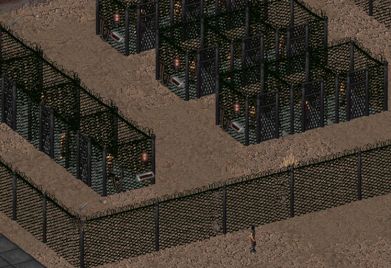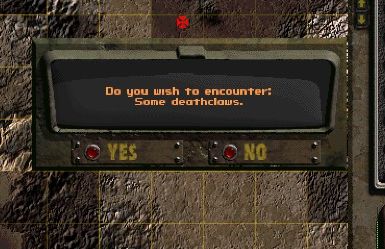Fallout 2 (1998)
A Super Mutation.
When it comes to conquering my gaming backlog, sometimes I want to knock out the shorter games first. Finishing Super Mario World, Castlevania II, or Leisure Suit Larry 3 will leave me feeling satisfied, like I gutted a big To Do List. But then there’s moments where I’m patient enough to take on time destroyers like Persona 5 or The Witcher 3, with main story campaigns alone stretching into triple digit hours.
I finished Fallout last month, a notable achievement in this lifelong hobby of mine. Considering how long it takes to complete the average RPG, I was surprised at its short length. Regardless, time doesn’t always factor into these cases. The sheer amount of brainpower needed also exhausts me. There are the epic story beats, stacks of dialogue trees, and giant text walls to absorb.
Naturally, this means I’ll follow up an RPG with something smaller. Except in this case, I wanted more Fallout. The first game drew me in because I was interested in learning the lore that preceded Fallout: New Vegas, which has accumulated the most hours out of any game in my Steam library. So when Fallout ended, I jumped right to Fallout 2.
Eighty years after the first Fallout, the original character has founded a village in Nevada. Now that village is dying in every way possible. Its salvation rests on finding an ancient piece of terraforming technology called the Garden of Eden Creation Kit, or GECK.
But first, the late Vault Dweller’s grandson/granddaughter, or Chosen One, must prove their worth. This is achieved by forcing them to navigate a rather crappy tutorial section called the Temple of Trials. While it’s nice Fallout 2 offers a primer in monster fighting, poison treating, lock picking, and trap disarming, it’s a frustrating drag if you aren’t prepared. You also aren’t allowed to leave this section until you complete it. Get used to that late ‘90s brown till you learn how to survive.
Outside the village, Nevada is a world of complete anarchic lawlessness. Folks are left to regulate themselves, and they don’t always do the most stellar job of shouldering the responsibility. Drugs and prostitution run rampant. So does slavery, in case the words “SLAVER’S GUILD” in a blatant building marquee didn’t give it away. In The Den, junkies crowd the streets like comatose zombies. Mafia families each have their own slice of New Reno carved up.
Over the border, however, the once fledging village of Shady Sands has blossomed into the New California Republic. As NCR works to expand its territory, the surrounding towns are in the process of either dealing or needing deals made. The Chosen One’s influence decides how it turns out. Maybe California represents law and order, or perhaps it’s Purgatory. But Nevada and California are a yin and yang, order and chaos. It emphasizes how much the post-nuclear world has exploded, let’s say, in the past eight decades.
The first game had a small offering of main areas, with a lot of walking space dividing them. It amounted to, at most, about 25 hours’ worth of content before the end. Fallout 2, by contrast, is much, much larger. With so much of Nevada, and a large chunk of the old map to explore, it takes a lot of in-game time to walk between towns. Random encounters often interrupt those walking trips, cutting into the player’s real-world time even further.
In other words, the developers dedicated themselves to answering the question, “How long would it take to walk across two states?” This commitment to realism is admirable, but the waking trips become tedious. But by completing a multi-tiered sidequest, your character can become the proud secondhand owner of the Pre-War Chryslus Highwayman.
The car is amazing. Its badass theme music is just the beginning of its pimp divinity. It zips between locations at a speed much faster than walking, while also cutting random encounters in half.
However, the car still has limits. It requires fuel to keep going, in the form of Energy Cells that aren’t available in every corner drugstore. Otherwise it stops dead wherever it runs out power, and you might find yourself trekking across the desert again. Driving in a post-apocalyptic wasteland is still, sadly, a privilege and not a right. It means planning trips, and gauging how much of a charge the car has left.
Of course, with or without the car, you still have to deal with random encounters. Fortunately, fights move much faster, and thank God for that. One of my biggest complaints about Fallout was how long you had to wait for every enemy to move. Here, Black Isle Studios must’ve recognized this being an issue. I don’t recall a single sluggish fight in Fallout 2.
Like before, villains in the shadows have hatched a sinister plot. But learning all the details is no longer locked behind a perilous sidequest. In Fallout, the game hid every detail about the Forced Evolutionary Virus deep within an irradiated hell gauntlet called The Glow. It was one of many lessons I learned about utilizing multiple saves.
Not anymore. In fact, one might say our central bad guy talks too much. Like a Bond villain, he assumes your death is inevitable and reveals everything. He says enough to make Fallout 2 stand on its own.
As for whether finishing Fallout is necessary to understand the sequel, anyone who skips it won’t feel lost. The latter is still a direct sequel to the former, nevertheless, and there are details the player may appreciate more by completing Fallout.
The story doesn’t just build on the last game, either. The world itself does as well. By finishing Fallout, you gain an appreciation for the uneasy camaraderie humans have formed with their mutated counterparts, and the way the villains’ new plot seeks to shatter all that. Fallout and Fallout 2 go hand in hand. They complement one another.
Is there anything Fallout 2 doesn’t improve? Sure. It still crashed when I played it on my Steam Deck. Interruptions weren’t as frequent as the previous entry, but it did happen, and it was always inconvenient.
On Normal difficulty, which is how I played it, Fallout 2 is not a brutal stair climb or a chore to play. I point this out because ‘90s CRPGs have a reputation for being impossible. The number of times I saved and reloaded to cheese in Baldur’s Gate is a record breaker. But Fallout 2 doesn’t hate you if you weren’t enough of a ‘90s tabletop nerd. While the heat did turn up toward the end, there was always another way to solve a problem; that, or reloading.
Sure, reloading is a necessity. But Fallout 2 is worth playing, and replaying. More than a fun, engaging game, it’s a cerebral experience. It doesn’t just improve upon the first game’s problems. It throws you into a world that feels alive, with sidequests worth doing, and a central issue worth resolving. Fallout was invaluable for introducing us to its universe. Fallout 2 takes that seedling and grows something better, with engine fixes and an epic journey to match.
Final Grade: ****


